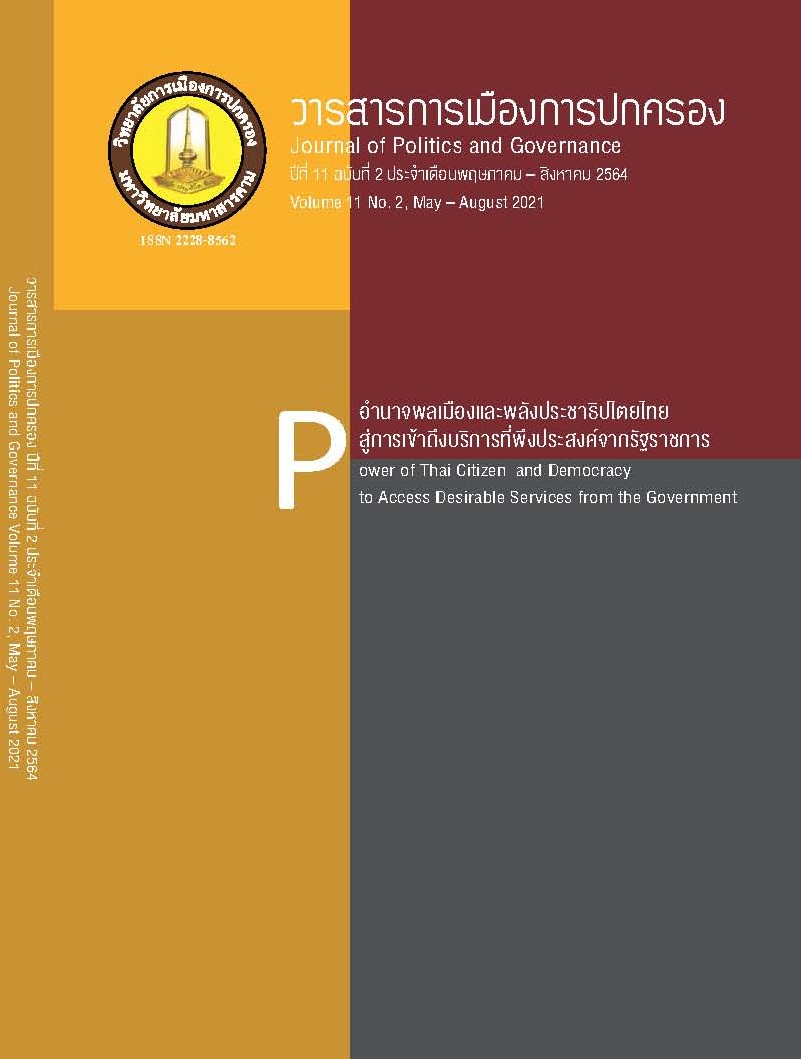Decentralization policy and strengthening local democracy
Main Article Content
Abstract
This research has following objectives : (1) to study the effects that the decentralization of the Thai state power has on the promotion of the local democracy, and (2) to study an appropriate form of strengthening the local democracy. The target group used in the research was obtained by selecting the specific method, consisting of 18 people. Data were collected by field interview. Observations and focus group discussion, It was found that 1) during the year of 1932 – 1996, there was only one law pertaining to the establishment of local government organizations, this law encompassed only the form and structure of such organizations. The people has little participation in the local politics and governance. During the year of 1997-2006, decentralization of power became concrete and clear. Provisions were made in the 1997 constitution for the first and time, enforce the state to decentralize its power to local authorities. An act was passed, laying out the plan and procedure of the decentralization of power to local administrators and members of local government councils come from the elections. It became clear that this had more impact on the promotion of the democracy. From the 2007 onwards, the process of decentralization was implemented in accordance with principles laid out in the constitution of 2007. The local administration organization became the main agency to provide public services. However, elected representatives who came into power has not been able to fully promote democracy. Therefore, various movements in the people’s sector were created and proposals were made to reforming the power structure of the state, in order to decentralize more power to the people’s sector and local communities. The coup of May 22, 2014, affected the movement of various groups. It put a temporary halt to the decentralization process. The implementation of the decentralization of power, as in accordance to the constitution of 2007, has not seen a clear direction in giving power to local areas in a manner that would strengthen the local democracy; 2) an appropriate form of strengthening the democracy in local areas should be composed of 4 main components: people’s participation in local politics; provision of local rules and regulation; people’s consciousness to be responsible to the public or community; and the ability to be self-reliant and/or self-manage.
Article Details
References
โกวิทย์ พวงงาม. (2549). การประเมินเมินองค์กรปกครองส่วนท้องถิ่นที่มีความเป็นเลิศด้านความโปร่งใสและการมีส่วนร่วมของประชาชนประจำปี 2549. กรุงเทพฯ: วิญญูชน.
คณะกรรมการปฏิรูปแห่งชาติ. (2553). ข้อเสนอการปฏิรูปโครงสร้างอำนาจ. กรุงเทพฯ: ที คิว พี.
ชนิดดา อาคมวัฒนะ. (2541). ผลกระทบของการกระจายอำนาจที่มีต่อโครงสร้างอำนาจท้องถิ่น:การศึกษาเปรียบเทียบองค์การบริหารส่วนตำบล. (วิทยานิพนธ์รัฐศาสตรมหาบัณฑิต).จุฬาลงกรณ์มหาวิทยาลัย.
นันทวัฒน์ บรมานันท์. (2552). การปกครองส่วนท้องถิ่นตามรัฐธรรมนูญแห่งราชอาณาจักร. (พ.ศ. 2540). กรุงเทพฯ: วิญญูชน.
ปธาน สุวรรณมงคล. (2540). นโยบายรัฐบาลด้านการปกครองท้องถิ่น ตั้งแต่ ปี 2476-ปัจจุบัน.วารสารธรรมศาสตร์, 23, (พฤษภาคม-สิงหาคม 2540). กรุงเทพฯ: สำนักพิมพ์มหาวิทยาลัยธรรมศาสตร์.
ปธาน สุวรรณมงคล. (2554). การกระจายอำนาจ แนวคิดและประสบการณ์จากเอเชีย.กรุงเทพฯ: สำนักพิมพ์แห่งจุฬาลงกรณ์มหาวิทยาลัย.
ศุภสวัสดิ์ ชัชชวาล. (2552). การกระจายอำนาจในประเทศญี่ปุ่นและไทย:การศึกษาเปรียบเทียบเพื่อให้เห็นถึงเงื่อนไขความสำเร็จของการกระจายอำนาจ. นนทบุรี: สำนักวิจัยและพัฒนาสถาบันพระปกเกล้า.
องค์กร IDEA . (2556). การประเมินคุณภาพประชาธิปไตย: คู่มือปฏิบัติ. กรุงเทพฯ: สถาบันพระปกเกล้า.


